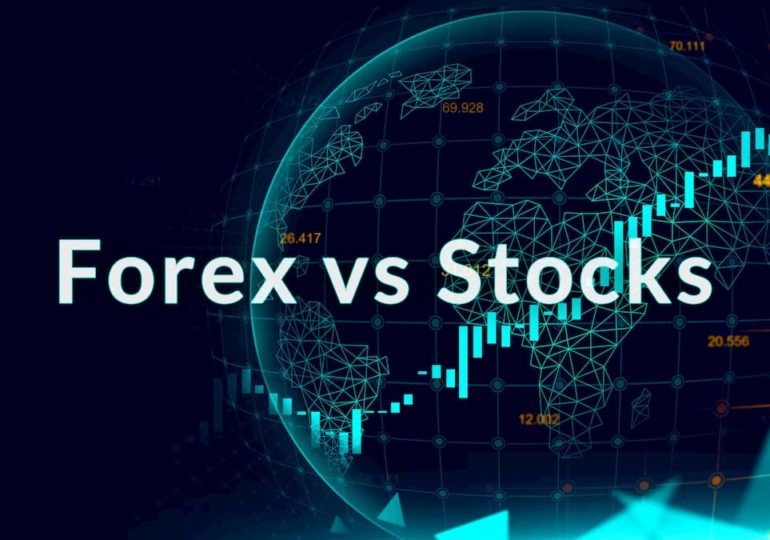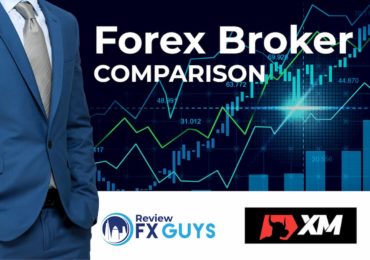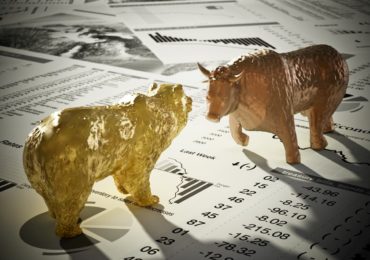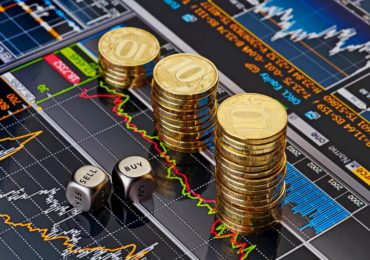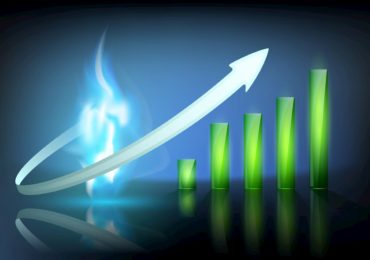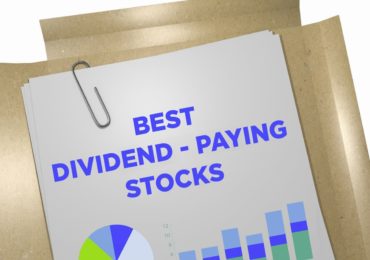The world of economics today has given us many platforms with which money can be made. However, if there is one topic that stands out today, it is whether it is better to trade on forex or stocks. This article on Forex vs Stocks would not only enlighten you on the better choice but also enable you to decide on which market to trade on. Here we would compare their general differences in terms of trading, trading times, margins, the focus of each market, leverage, liquidity, and many more options.
New and existing traders today wonder which is the better option – “trading forex or stocks.” Let us begin answering this question with the majority of the tools provided us by the trading market. The world we find ourselves today is a low-interest environment with central banks around the world wrestling with weak growth, having to implement loose monetary policies as the main answer to many problems for many years now.
Leaving your money in the bank does not simply cut it, as this option does not yield any profit whatsoever. In many of the major economies today, you find yourself at a loss when you save money in the bank because interest rates paid on savings is less than the rate of inflation. Leaving you with only one option, looking for a better way to invest your money. Good investment options include well-established markets of Stocks and Forex. To enlighten you on which is a better option for you based on what you have in mind, we should consider the pros and cons of Stock trading and Forex trading.
So, what is the best to trade? Let’s look at the facts surrounding forex vs stocks.
Personal Objectives
I think this does come down to your personal objective, as much as anything.
Long-term investment objectives
Talking about investment perspectives now, stock market investing is for the long term. For example, if you have a long-term objective, say a five to ten-year plan where you might want to look to fund a pension or pay for school fees, then trading stocks will be the preferred approach.
If you can find some stocks with some decent balance sheets, price-earnings ratios, outlook, a good customer base and a sound business model then this could be your preferred approach.
Think about it for a moment; most pension funds that make up the pension industry are made up of stocks and bonds or a combination of both. Very rarely do you see a pension fund made up of foreign exchange exposure. So, stocks are generally used as a long term investment
Short-term investment objectives
On the other hand, if your objective is short term, perhaps you’re looking to supplement your income, or possibly give up your day job altogether to become a full-time trader. Then, in that case when considering forex vs stocks, forex might be the preferred approach.
First of all, if you’re trading in the stock market, there are literally thousands and thousands of different stocks available to trade globally. Of course, if you look at SMP, for example, that’s made up of 500 US Top stocks. The Russell index, made up of 3000 stocks which are of course just in the United States alone. The same in the UK and around Europe, the stock market is made up of multiple stocks, and getting a handle on any one individual stock could be quite difficult.
You have to do a lot of research to make informed choices regarding forex vs stocks. So, if you’re persuaded you can do this research (if you’ve got the know-how, the experience, you can analyse company data, you can analyse balance sheets), then, of course, stocks can be very, very profitable. But there are many stocks out there that you need to do this analysis on if you want to profit.
On the other hand, the Forex market is generally made up of ten different currency pairs. So, you actually spend a lot less time analysing an individual currency pair than the vast array of stocks available out there.But again, it depends on personal objective, and of course, the amount of time that you can allocate to doing this – the analysis of either stocks or Forex.
Note: if you are inclined to be a fundamental trader (a fundamental trader looks at the reasons why a stock or indeed a currency pair will move) then of course, trading stocks may be your preferred way to go,This is because the fundamentals of stocks are not as easy to understand as the Forex market, because you would need to understand how to read a company, balance sheets, and so forth.
If on the other hand, you want to be a technical trader, then I would suggest that the Forex market might be easier. The Forex market is huge,it has massive participation of over $5 trillion a day made up of retail, 170 different currencies around the world, four times the trading volume compared to the global gross domestic product, and of course, institutional players.
Ease of Access
Another factor to consider in forex vs stocks is the ease of access, it is far easier when starting off to access the Forex market than it is the stock market. Often people entering trading for the first time only have a limited amount of money, or may only want to risk a limited amount of money to see if trading is for them or not.
When you start trading the Forex market, you can start with just a few hundred dollars, but it is difficult to do that in the stock market. Many brokers won’t allow you to even open an account to trade stocks unless you have a few thousand dollars to start with, which is significantly higher than opening up a forex account.
Leverage
Moving forward, another thing you have to consider with forex vs stocks is leverage. If you’re starting with just a $1,000, the Forex market offers good leverage and sometimes very high amounts of leverage.
I don’t encourage anyone to trade with insane amounts of leverage. In the old days, there used to be an offer of 200 or 500 to one; I think that’s ludicrous. You should be trading leverage, really nothing more than 20 to one. The recent ESMA regulations in Europe, in fact, pulled down the leverage that is permitted, but when you’re trading the Forex market, you have access to huge leverage.
You can start with just $1,000 if you’re trading 20 to one leverage, you’re exposing yourself to $20,000 in the market. That’s not as easy to do when you’re trading the stock market as you need a higher amount of money to start with when you’re trading the stocks. And indeed, if you’re learning, then you may not want to risk a higher amount when deciding whether or not trading is for you or not.
So, leverage is available in the Forex market much more so than in the stock market, and you can start experimenting, the small amounts of money to see if you have what it takes to make the best out of the forex market. The cost of trading, generally speaking, is cheaper in the Forex market. In some cases, you may just pay a small commission, and the spread while in some cases, you only pay the spread.In stocks, it’s almost certain you’re going to spend money on the spread, as well as a decent-sized commission, certainly more than the Forex market in most cases. So, if you’re starting in trading and you’re deciding if this is going to be right for you. The last thing you want to be doing is competing against a broker with the fees and the spreads and the commission’s as well.
Trading times

The Forex market is open 24 hours a day. So, no matter what time zone you’re in, there’s always going to be a market open except on weekends. Certain times of the day will be more liquid, of course, but you can trade different currencies in different time zones to fit where the liquidity is fitted to your lifestyle. Suitable if you’ve got a day job, or you may be a shift worker or only have a few hours a day in the evening.
If you’re trading the stocks for example, stock markets are generally open from 8am to 4pm, and once the stock market is closed, you can’t trade. If you want to trade the US market, generally speaking, you’re going to be there when the US stock market is open at specific times.
Liquidity

The next thing you need to consider is liquidity. Now the major forex pairs generally have substantial liquidity, certainly the Euro against the US dollar, which is the most actively traded currency pair out there. This means that you can always get out of a position whether it’s for profit or loss without too much slippage – the difference in the price that you see on the screen to the price you get filled at.
Sometimes in stocks, certainly in the lower cap stocks, this liquidity is not always there, which means the slippage can be higher. Now and then you may be in a position, you want to get out of but you can’t get out because equity has dried up. So, what you see on the screen isn’t necessarily what you get. However, for smaller accounts, this liquidity can affect you, and the last thing you want to do is lose money on the slippage.
The high cap stocks, usually have elevated liquidity, but the high cap stocks generally mean that the price of the stock is going to be higher. If the price stock is higher, chances are that when you’re starting trading in a smaller account; you’re not going to be able to get much exposure because the price of the stock is higher, So liquidity is a main factor. There is super high liquidity in the Forex market, and sometimes not as high liquidity in the stock market. If there is high liquidity in stocks, generally the cost of the stock is higher, meaning your exposure to that stock is going to be limited.
If you’re inclined to be a technical trader, look at previous price action and look for patterns that repeat themselves. Look at the charts to see where the prices have been in the past, and where prices may go in the future. In my opinion, the technical traders are more angled towards the forex market than they are the stock market.Why? Because the Forex market is the largest market on the planet. This equates to $5 trillion a day. Thus, the key levels of support and resistance are more respected in the Forex market, because there are many more players than there are in the stock market, which is generally driven by fundamentals more so than the technicals.
As I said, this is a personal choice based on objectives and based on one’s character.
- Are you more likely to be a fundamental trader?
- Where you’re looking to analyse company balance sheets and looking for price earning ratios and looking at markets in general?
- Or are you more likely to be a technical trader?
In which case, I think the Forex market might be a preferred choice. As previously mentioned, many of the factors here are subject to personal opinion because many of these options differ in preference with each person.
Conclusion for Forex vs Stocks
Looking at all we have discussed so far about forex vs stocks; it is evident that the technicality of the stock market and the forex market leaves everyone with a choice on which side they would prefer to make a source of income. One thing is sure, a majority of people move from one source of income to another due to one constant factor amongst others, and that is a lack of information. They dive into the forex market and face a lot of challenges. Which makes them wonder if this trading option is for them.
They try the stock market and again wonder why things are not going as expected. Finally, they dwindle from one source to the other, wasting a lot of resources and energy, only to come out with no results.
The truth of the matter with anything you do is that success takes time, and anything that would eventually prosper would need consistency. With the information about forex vs stocks, you have taken from this article alongside other research and persistence, you’re well on your way to making the most of your trading adventure.


